I’m sure you will agree with me when I say:
Mixing salt water is an art.
If the salinity levels in your tank are too low or too high, your fish and corals can become stressed and, in extreme cases, die.
That’s why measuring salinity is an important part of owning a saltwater tank.
A good hydrometer does exactly that.
With some brands claiming accuracy to 0.001 specific gravity units, it could be the perfect tool for monitoring your salinity levels.
Today, I am going to put 13 hydrometers to the test for accuracy, usability and performance. All to answer one single question:
Which hydrometer is best and is it worth your money?
Read on to learn more about my experience with hydrometers.
With the introduction out of the way, let’s jump into the guide. Starting with the most important part…
Contents
Why I don’t recommend hydrometers for aquariums
If you are serious about your reef tank, then I recommend using a refractometer to measure the salinity of your aquarium.
Yep, skip the hydrometer and head over to my guide where I show you the best refractometer to buy.
Why?
There is too much room for error when using a hydrometer!
When using a hydrometer, you need to…
- Rinse before using
- Monitor your water temperature
- Test on a level surface
- Make sure no bubbles are trapped
- Look at the hydrometer straight on
Failing to do any of these can return an incorrect reading. And, that assumes that you have a correctly calibrated hydrometer to begin with. As we found out during testing, the results a hydrometer gives can be off by quite a bit.
Same water. Three different hydrometers. Three different results.
Here lies the problem: You are essentially trusting the lives of your fish with this device. If the salinity of your aquarium is too low or too high, you risk stressing your fish. Or worse, killing them.
The only advantage a hydrometer has over a refractometer is that it’s cheaper. But not by much. And definitely not enough to justify the cost of replacing your fish and corals.
Even though I am certainly biased against hydrometers, I respect that some hobbyists still choose to use them.
And if that’s the case, then you want to buy the best hydrometer possible, right?
So rather than ignore your needs, I created this guide to help you find the best hydrometer for your aquarium.
What is an aquarium hydrometer and how does it work?
A hydrometer is a tool that measures the salinity in your aquarium, returning a result in either specific gravity (SG) or salinity PPT (parts per thousand.)
While there are two different types of hydrometers, which I cover in the next section, they both work the same – by floating.
To put it simply, the higher the salt content, the denser your water is. Because a hydrometer is a precisely weighted device, it will float in saltier water and sink in less salty water.
You can’t go out and buy any old hydrometer. Some are designed for testing beer while others test honey or antifreeze. Obviously, these are no good for testing the salinity or specific gravity of your aquarium, so double check the box before you buy.
What are the different types of aquarium hydrometers?
When it comes to saltwater aquariums, there are two types of hydrometers that you will come across, one much more common than the other…
1. Swing arm hydrometers
These are the most popular type of hydrometers used in aquariums. Cheap and commonly available, you’ll find this on the shelves of most local fish stores.
Fill up the hydrometer by dunking it in your saltwater tank and then place it on a level surface. The needle inside will rise according to the salinity of your aquarium water, giving you a measurement. It’s this moving needle that gives the swing arm hydrometer its name.
See it in action below…
Simply line the needle up with the scale to determine the salinity of your aquarium.
Pros
- Affordable
- Inexpensive
- Easy-to-read
Cons
- Requires strict steps to be accurate
- Can be difficult to read
- Large
2. Floating hydrometers
While it might look like a thermometer, a floating hydrometer works differently. Simply place the hydrometer in your saltwater aquarium, and it will float according to the salinity of your water.
Just how well this glass hydrometer floats reveals if you have enough salt in your aquarium. If the hydrometer sinks, you need more salt. If it floats too much, you need less. As far as testing your salinity goes, it’s effortless.
Just how well the hydrometer floats is used to determine the specific gravity or salinity of your water. Clever, huh?
Don’t understand how this works? Let me show you…
Below you see a hydrometer floating in the bucket I use to mix salt, to confirm that I have the salinity just right…
So, why aren’t floating hydrometers more popular?
Made from glass, floating hydrometers are delicate. You see that round design? It rolls, making it easy to bump off your counter when cleaning your aquarium. Also, if you work with gloves on, then the slim design can be difficult to grip. If this hydrometer drops to your floor, it will shatter into tiny pieces of glass.
Floating hydrometers are not very popular in the aquarium hobby. In fact, in all my years of fishkeeping, I have only personally come across one aquarist who used them. And, he was definitely what I call ‘old school.’
Due to the lack of popularity, floating hydrometers can be difficult to find. There are a few aquarium brands that manufacture floating hydrometers, such as Sera and Imagitarium, but your local fish store probably won’t keep these on the shelves.
For this reason, aquarists who use a floating hydrometer typically buy them from stores that sell glass lab equipment.
Pros
- More accurate
- Smaller sized
- Easy-to-read
Cons
- Breakable
- Expensive
- Not readily available
How I tested the hydrometers
To make the test fair, I had to eliminate a few variables that could impact the results. After all, how can I pick the best hydrometer if my testing methodology is flawed?
I can’t. So to make sure I was confident in my results, I had the help of some fancy scientific equipment.
First, it is worth mentioning that hydrometers are calibrated for a specific water temperature, 68-85°F (20-29°C).
So to make sure the water being tested remained a constant temperature, I used my trusty NIST-calibrated thermometers, the same ones used when I tested the best heaters and best thermometers. If you are in the market for either of these, I suggest checking out these guides!
The water was heated to 77°F (25°C) using one of my favorite aquarium heaters, the Eheim Jager TruTemp heater.
Next up, I had to make sure that the salinity was constant. After all, if I didn’t know the salinity of the water, how could I determine the accuracy of the hydrometers tested?
So, I used my trusty conductivity meter to check. I then cross-checked these results with both a handheld and digital refractometer.
Finally, I had to make sure the surface I was resting on was perfectly level. To do that, I used a torpedo level, this one to be precise – you know, the type that builders use. I figure if you are going to be placing the hydrometer down on your counter, then it’s likely that one of these was used to ensure your counter was level in the first place.
With the variables taken care of, we set out to test all the different hydrometers on the market. Which leads me to the next section…
The best and most accurate hydrometers for your aquarium
If you are going to buy a hydrometer, you want the best.
Don’t worry, that’s where I come in. You see, I tested all the common hydrometers on the market for accuracy, usability and performance, including:
- Kent Marine
- Instant Ocean
- Hikari Aquarium Solutions Accuprobe
- Fluval
- Coralife
- Kordon
Best swing arm hydrometer: Instant Ocean
Test after test, the Instant Ocean hydrometer accurately reflected the same salinity measurements taken with the more precise meters and refractometer. Whether we added more salt or diluted the mix, it was able to keep up just fine.
As you know, it’s only true if it’s repeatable. So, we purchased two more Instant Ocean Swing Arm Hydrometers – just to see if they all gave the same reading…
Sure enough…
They did.
Now, this isn’t to say that all Instant Ocean hydrometers are perfect. After all, there are many user reviews on Amazon that claim that they received a faulty unit. However, it is difficult to determine whether user error or the hydrometer is at fault.
However, I can confidently say that out of all the hydrometers that we reviewed, the Instant Ocean was the best of the bunch.
Best floating hydrometer: Sera Marin
The Sera Marin hydrometer hit the sweet spot – accurate and affordable. Drop it in your saltwater mix, and the stem of the hydrometer will accurately show you its salinity.
As a bonus, the styrofoam packaging doubles as storage when the glass hydrometer is not in use. Given how fragile glass hydrometers are, I was surprised to see that many of the competition skipped over this essential accessory.
It’s a simple and accurate hydrometer… there really isn’t much more to say about it.
The competition and runners-up
Unfortunately, for there to be winners, there have to be losers. While the battle was fierce, the following hydrometers let me down in one way or another and allowed our top picks to take the crown!
Swing arm hydrometers that didn’t make the cut…
The Kordon Coral Sea Hydrometer was simple and effective. In terms of performance, it returned the same consistent results as our top pick. Even though it did not have any extra holes or channels for water to flow in, we found that its unique design worked really well at preventing air bubbles from becoming trapped. The only downside is that it is not commonly available.
The Kent Marine Hydrometer worked well and was accurate to the point where it could be recommended. However, the smaller, more limited scale made reading the results more difficult than my top pick.
There was something funny about the Coralife Deep Six Hydrometer. It consistently returned results that were too high. And, it definitely wasn’t because there were bubbles attached to the arm because the sponge in the opening of this hydrometer did a fantastic job of preventing bubbles from being trapped.
While we liked the idea behind the Coralife BioCube Mini Hydrometer, a small-size hydrometer designed to stick to the glass of your aquarium, it didn’t work well in practice. The suction cups didn’t want to hold, and the hydrometer kept falling to the bottom of my aquarium. If you can get it to stick, the needle will bounce around with the water movement of your aquarium making it impossible to get an accurate reading.
The Aquarium Solutions AccuProbe Mini proved that when it comes to aquarium hydrometers, size matters. The small scale not only makes it difficult to read, but also if your salt levels are too far out, it’s difficult to determine by how much.
Another hydrometer that can permanently sit inside your saltwater tank, the Fluval Sea, also proved difficult to read when inside the tank. The current from our wavemaker caused the needle to bob around. Outside the tank, we found that the scale was laid out too close together, which made reading an accurate result difficult. And given the results after numerous tests, I have strong doubts that the hydrometer I received was calibrated correctly.
Floating hydrometers that didn’t make the cut…
No real complaints about the Vee Gee Specific Gravity Hydrometer. This lab-grade hydrometer was accurate and easy-to-read. You can do no wrong with it. Unfortunately, it did not come with a method to store it in when not in use. It was also significantly more expensive than other glass hydrometers we tested. Now, I must stress that these are in no way deal breakers. Without these minor faults, I would have awarded this the number one spot.
I honestly thought that the Tropic Marin Precision Hydrometer would be crowned the winner. Made in Germany and coming in an easy-to-open protective case, the hydrometer had a lot going for it. Oh, and it’s darn accurate too. Unfortunately, the size holds it back. Measuring 14 inches, this is the largest glass hydrometer on the market. For many, it will be too big and bulky.
The Dr. Marine Saltwater Hydrometer had an interesting feature – a thermometer to ensure that the water was the correct temperature for testing. Unfortunately, if you use the hydrometer in your bucket, looking down, the temperature is nearly impossible to read. Not only that, but the thermometer was far from accurate.
The Imagitarium Hydrometer was a variation of the Dr. Marine glass hydrometer. It also contained an inaccurate thermometer. Worse still, no protective case is included with the purchase – something these fragile products desperately need.
Besides the packaging, the Living Sea Hydrometer was identical to the Imagitarium hydrometer in every way.
How to season your hydrometer
Some of the swing-arm hydrometers I tested, such as Coralife and Kent, recommended that I soak the unit in salty water for at least 24 hours to season the needle before use. Other hydrometers, like Instant Ocean and Fluval, made no mention of seasoning at all.
So, you might find yourself asking the question:
Why do I need to season my hydrometer?
Despite what other fish keepers might say, seasoning your hydrometer has nothing to do with making the needle more accurate – it does not calibrate your hydrometer. I tested each hydrometer before and after seasoning, and there was no noticeable difference in accuracy.
Instead, seasoning will remove traces of oils, dust, plasticizers and other gunk. You know, all the nasty stuff that is left over from the manufacturing process.
Obviously, you don’t want any of that nasty stuff in your aquarium, especially if you have sensitive corals.
That’s why seasoning is important. A soak overnight will remove this gunk, making your brand new hydrometer safe to use in your aquarium.
And don’t worry, you don’t need to season your hydrometer before each use. Just the first time you use it. But let’s be realistic, you should be cleaning anything you plan on putting inside your aquarium anyway.
How to clean your aquarium hydrometer
Hydrometers, specifically the swing arm variety, need to be kept clean in order to maintain accuracy.
Any salt crystals that cling to the needle can weigh it down, causing an incorrect measurement.
This is why you should rinse your hydrometer in freshwater after each use – to stop salt from accumulating.
If it’s too late for that, and your hydrometer is looking saltier than McDonald’s French fries, then you have some cleaning to do.
Removing built-up salt from a hydrometer is easy. Simply soak it in vinegar for 30 minutes. Completely cover the entire hydrometer, and you might need something to weigh it down.
When finished, remove the hydrometer, and rinse it with fresh water. Now, leave it to dry, and you will have a nice clean hydrometer the next time you need it.
Conclusion
As you see, under controlled conditions, hydrometers can be used to accurately measure the salinity and specific gravity of your aquarium.
Let me repeat that…
Under controlled conditions.
In our review, we accounted for all the variables that could possibly cause a properly calibrated hydrometer to return an inaccurate reading.
In real life use, there are a lot of variables that could lead to an inaccurate result, including uneven surfaces, water temperature, air bubbles, maintenance – your hydrometer could even be faulty out of the box.
And, now we get to the crux of the issue…
You are trusting the lives of your fish and corals to this device. And considering a good entry-level refractometer doesn’t cost a whole lot more, I personally cannot recommend a hydrometer for everyday aquarium use.
If you want to make up your own mind or want a backup way to measure salinity then my top pick, the American-made Instant Ocean Hydrometer is as good as it gets.
As for me? I’m sticking with my refractometer.
Do you use a hydrometer in your aquarium? Let me know in the comments below!

Ian Sterling, founder of Fishlab.com, began his aquarium journey over 30 years ago, driven by a deep fascination for fish and their diverse personalities. His website, Fishlab.com, is dedicated to making fishkeeping accessible and enjoyable, offering beginner-friendly guidance, expert insights, and a community for aquarists to connect and share experiences.


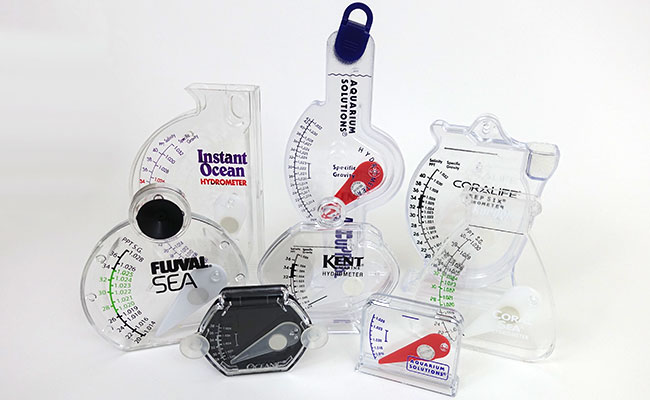
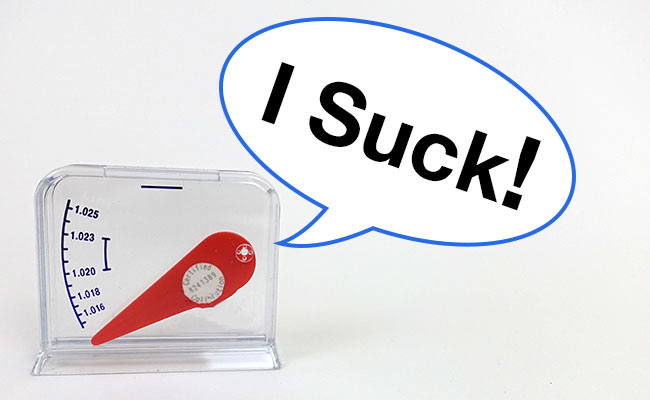
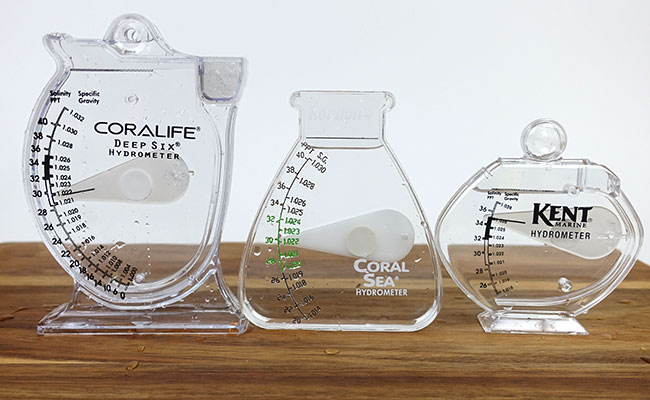
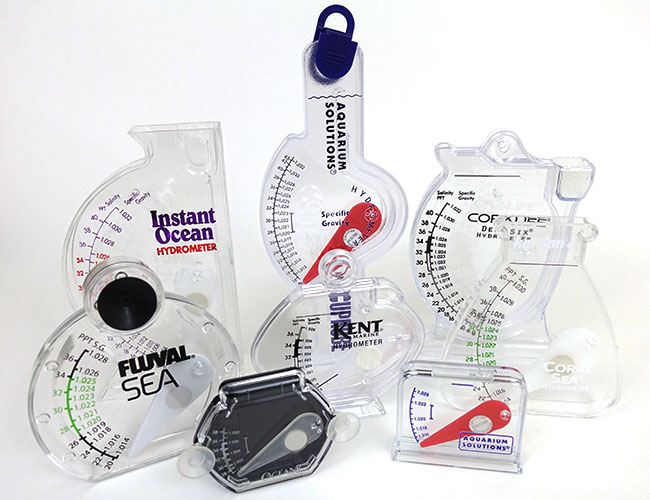
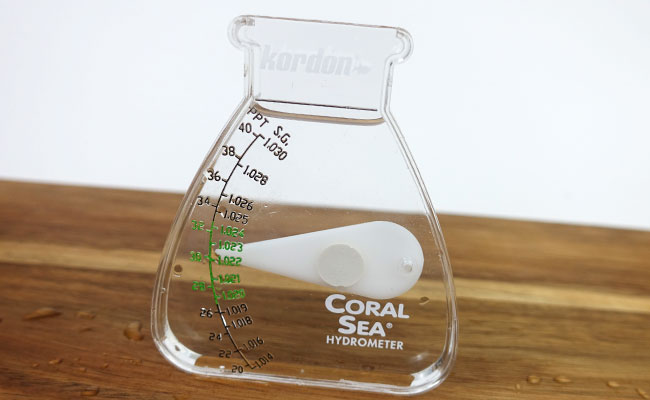
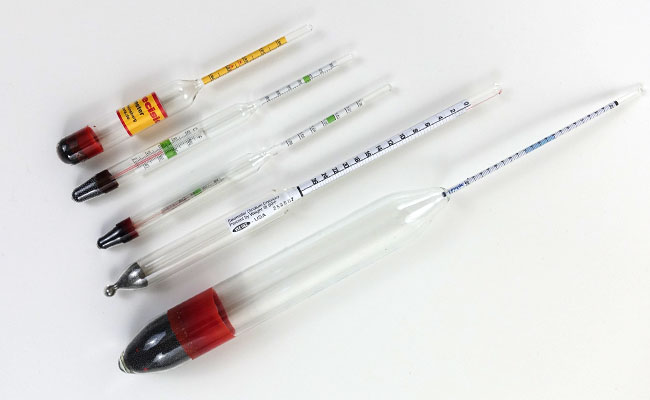
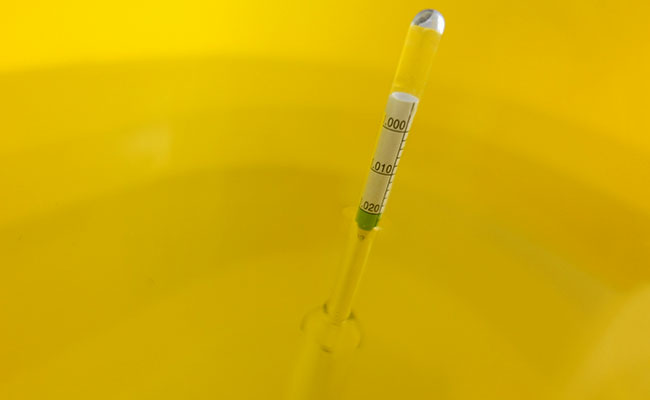
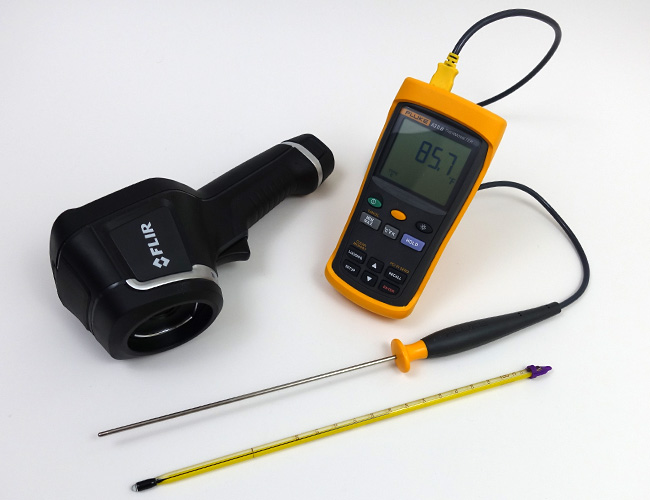
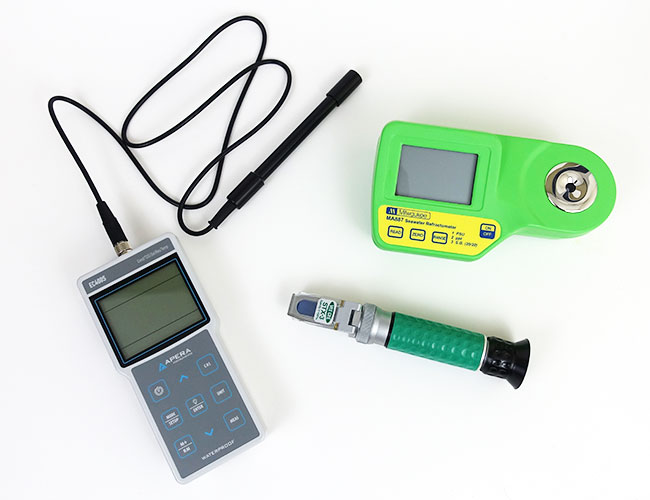
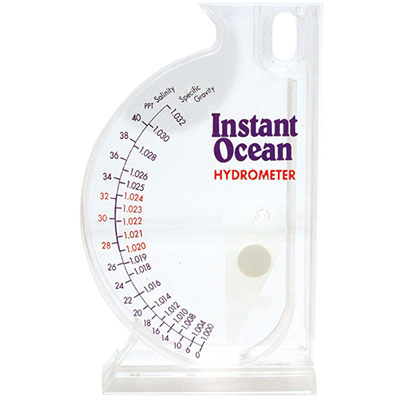
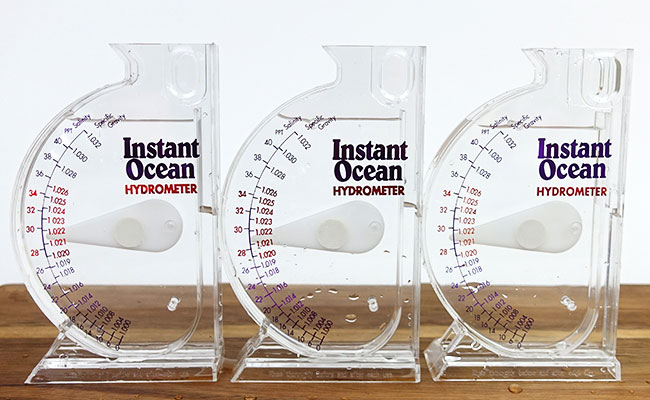
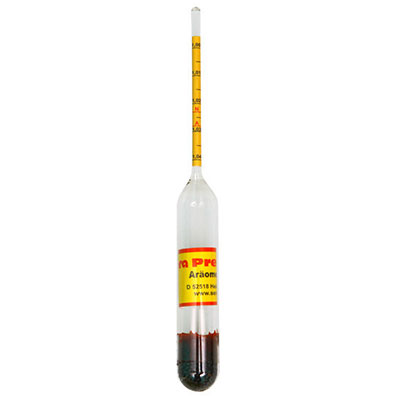
Comments (2)
THANK YOU.
I was considering a hydrometer but based on your recommendations bought a refractometer. It wasn’t much more expensive but it seems to be accurate.
Hi Takisha,
Glad we could help. I don’t believe you’ll regret choosing a refractometer over a hydrometer!